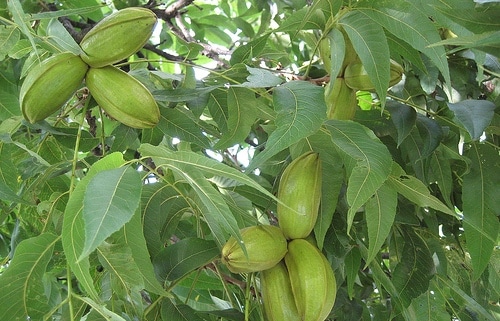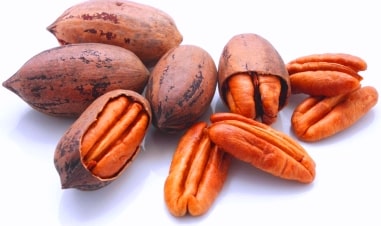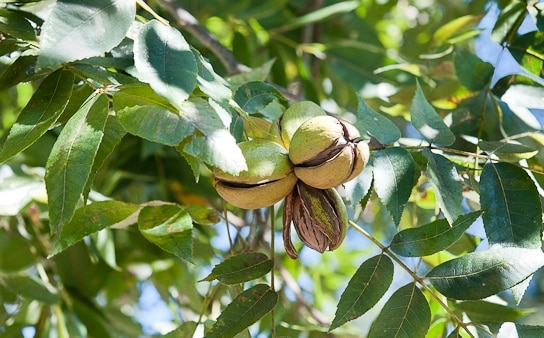Pecan Farming Guide:

Introduction of Pecan:- Pecan is one of the important nut fruits grown in the world. Pecan kernels are good source of nutritional value. This nut is native to Mexico, south central and south-eastern regions of the USA. Pecan belongs to the family of “Juglandaceae” and genus of “Carya”. Pecan nut is introduced in India around 1930’s in Himachal Pradesh. The commercial cultivation of pecans is limited in India. However, due to its high nutritional value and health benefits, the pecan farming has great future in India. In this article, let us discuss about pecan farming details.
Health Benefits of Pecan:- The following are the health benefits of Pecans.
- Pecans are good for cardiovascular health.
- Pecans are good for digestive health.
- Pecans have anti-inflammatory benefits.
- Pecans are good for bone & teeth health.
- Pecans help in weight loss.
- Pecans help in reducing blood pressure.
- Pecans have anti-cancer properties.
- Pecans help in strengthening the immune system.
- Pecans help in preventing skin problems.
- Pecans have anti-ageing properties.
- Pecans prevent hair loss.
- Pecans reduce the risk of heart stroke.
- Pecans reduce the risk of breast cancer.

Major Production States of Pecans:- Himachal Pradesh, Uttar Pradesh, Nilgiri hills and Jammu Kashmir.
Climate Requirement for Pecan Farming:- Pecan nut trees prefer warm climatic conditions and well adopted to subtropical areas. Pecans also thrive well in regions having short, cold winters and long and very hot summers. This nut requires 8 months to 9 months growing season with a mean temperature above 27 °C. For good flowering and budding, it requires low temperatures and even frost during June to August months. As rainfall is concerned, it prefers medium to low rainfall during its growth period.
Soil Requirement for Pecan Farming:- Pecans can be grown on wide range of soils. However, they grow well in fertile well-drained, well-aerated deep sandy loam soils rich in good organic matter. The soil pH of 6.2 to 6.5 is ideal for its cultivation. This nut tree tolerates alkaline soils, zinc deficiency soils.
Varieties of Pecan:- For profitable pecan farming, it is essential to plant pecan varieties that comply with the high standards concerning adaptability to the region, disease tolerance, kernel percentage, yield, nut size and shape, appearance & taste of the kernels.
Some of the hybrid/commercial cultivars of pecan are as follows. Mahan, Burkett, Nellis, WesternSchley, Western, Stuart, Desirable, Mohawk, Chicksaw, Cheyenne and Wichita.
Propagation in Pecan Farming:- Pecan plants are propagated by seeds as well as vegetative means. Rootstock plants are raised through seeds & grafted/budded with the desired varieties.
- Seed Propagation in pecan farming: Seeds from best performing trees should be used to raise the plants. Seeds should be treated for better germination before sowing. Pecan seeds should be stratified in layers of moist sand @ 3 °C for 3 months to 4 months or incubated @ 35 °C for a month. In India, rootstocks are raised from the seeds of Burkett and Nellis cultivars.
- Vegetative Propagation in pecan farming: Cuttings, stooling, grafting and budding methods are successful in vegetative propagation.
Land Preparation, Planting in Pecan Farming:- In advance of planting pecans, soil should be prepared to the fine tilth stage by giving 2 to 3 deep ploughings. Soil should be weed free and at least 2 m deep. Supplement the field with appropriate farm yard manure (FMY). It is recommended to for soil testing before planning for pecan farming to analyse the soil characteristics and soil nutrients.
Square system is adapted in Pecan farming and these are planted at a distance of 8 to 10 meter. Pits size of 1 meter x 1 meter x 1 meter should be dug and filled with mixture of top soil, well rotten farm yard manure (FMY) of 25 to 40 kg, 500 grams of single superphosphate and 40 to 50 grams of Chlorpyriphos for each pit. After transplanting the plants from the nursery, place them in the pits spreading roots equally in all directions and secure the soil by preparing the basin. Irrigation should be given immediately to settle the soil.
Training and Pruning in Pecan Farming:- To get the proper shape and size, it is essential to carry out the training and pruning in pecan cultivation. In pecan nut farming, plants are generally trained on central leader system. The lowest branch should be kept at a height of 1 meter from the ground level where as other branches should be placed spirally at a distance of 30 cm from one above another. After establishing the frame work, carry out the light pruning on matured pecan trees. Heavy pruning not recommended as it results in vigorous vegetative growth hence low in production. Only damaged and dried branches should be removed and overcrowded branches needs thinning.
Weed Control in Pecan Farming:- Pecan tree basins should be mulched with dry grass to conserve the moisture, control the weed growth. Mulching also provides good organic matter with decomposition of grass. Make sure to protect the pecans from rats. Always keep the tree basins weed-free by cleaning on regular basis. Pre-emergence herbicides should be used to control the weeds Simazine and Diuron (3 to 5 kg/ha) can be used to control the grass weeds. Paraquat of 1 kg per ha can be applied as contact herbicide.
Irrigation in Pecan Farming:- Pecan trees require more water compared to other nut trees. Proper irrigation will result in quality nuts and good yield. This also improves kernel yield, nut weight, size and oil content. Pecan trees can be irrigated through basin, sprinkler, furrow, and drip irrigation methods. The frequency of irrigation depends on the soil moisture holding capacity and weather conditions. In extreme hot conditions, make sure to give sufficient irrigation.
Intercropping in Pecan Farming:- As pecan plants have lot of inter space and comes into late bearing, farmers can use this during couple of years for cultivating inter crops like cow pea, soya bean, tomato, peas, pulses, beans and any low growing fruit crops. The cover crops improve the soil nitrogen levels and prevent from soil erosion.
Manures and Fertilizers in Pecan Farming:- The response to fertilizers is very slow as these plants have deep and well-spread root system. Farm yard manure of 100 kg should be applied in the month of December along with 500 grams of N:P:K (15:15:15) / year age of the tree and 8 kg mixture to the full bearing tree of 16 years and above. Make sure to apply these fertilizers in spring. Foliar application of zinc and manganese can prevent the deficiency of these nutrients.
Harvesting in Pecan Farming:- In India, most of the Pecan varieties are ready for harvesting in the month of October. Pecan nuts should be harvested when the pod split open and separated from the nuts. Early harvesting should be avoided for better quality of nuts. Harvesting with the help of bamboo poles is preferred.

Yield in Pecan Farming:- On an average, a fully matured pecan tree will produce about 25 to 30 kg. However, yield depends on the cultivar and farm management practices.
For Commercial Goat Farming: Read here.
Am interested in farming pecan nuts. Am in Botswana
Toomuch adds, content not visible due to this repeted adds, useless information